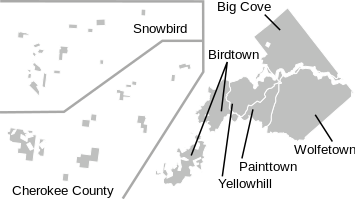
Swain County is a county located on the far western border of the U.S. state of North Carolina. As of the 2020 census, the population was 14,117. Its county seat is Bryson City.

Cherokee is a census-designated place (CDP) in Swain and Jackson counties in Western North Carolina, United States, within the Qualla Boundary land trust. Cherokee is located in the Oconaluftee River Valley around the intersection of U.S. Routes 19 and 441. As of the 2020 census, the CDP had a population of 2,195. It is the capital of the federally recognized Eastern Band of Cherokee Indians, one of three recognized Cherokee tribes and the only one in North Carolina.

The Qualla Boundary or The Qualla is territory held as a land trust by the United States government for the federally recognized Eastern Band of Cherokee Indians (EBCI), who reside in Western North Carolina. The area is part of the large historic Cherokee territory in the Southeast, which extended into eastern Tennessee, western South Carolina, northern Georgia and Alabama. Currently, the largest contiguous portion of the Qualla lies in Haywood, Swain, and Jackson counties and is centered on the community of Cherokee, which serves as the tribal capital of the Eastern Band of Cherokee Indians. Smaller, non-contiguous parcels also lie in Graham and Cherokee counties, near the communities of Snowbird and Murphy, respectively.
The Eastern Band of Cherokee Indians (EBCI), is a federally recognized Indian tribe based in western North Carolina in the United States. They are descended from the small group of 800–1,000 Cherokees who remained in the Eastern United States after the U.S. military, under the Indian Removal Act, moved the other 15,000 Cherokees to west of the Mississippi River in the late 1830s, to Indian Territory. Those Cherokees remaining in the east were to give up tribal Cherokee citizenship and to assimilate. They became U.S. citizens.

Harrah's Cherokee Casino Resort is a casino and hotel on the Qualla Boundary in Cherokee, North Carolina. It is owned by the Eastern Band of Cherokee Indians (EBCI) and operated by Caesars Entertainment. It is located on the site of the former Frontier Land theme park.
Joyce Dugan is an American educator, school administrator, and politician; she served as the 24th Principal Chief of the federally recognized Eastern Band of Cherokee Indians (1995-1999), based in Western North Carolina. She was the first woman to be elected to this office, and as of 2024 the only one.

Cherokee Preservation Foundation is an independent nonprofit foundation established in 2000 as part of the Tribal-State Compact amendment between the Eastern Band of Cherokee Indians (EBCI) and the State of North Carolina. The Foundation is funded by the EBCI from gaming revenues generated by the Tribe; it is not associated with any for-profit gaming entity and is a separately functioning organization independent of the Tribal government. It works to improve the quality of life of the EBCI and strengthen the western North Carolina region by balancing Cherokee ways with the pursuit of new opportunities.

In the United States, cannabis is legal in 38 of 50 states for medical use and 24 states for recreational use. At the federal level, cannabis is classified as a Schedule I drug under the Controlled Substances Act, determined to have a high potential for abuse and no accepted medical use, prohibiting its use for any purpose. Despite this prohibition, federal law is generally not enforced against the possession, cultivation, or intrastate distribution of cannabis in states where such activity has been legalized. On May 1, 2024, the Associated Press reported on plans by the Drug Enforcement Administration to move cannabis to the less-restrictive Schedule III.

The legal history of cannabis in the United States began with state-level prohibition in the early 20th century, with the first major federal limitations occurring in 1937. Starting with Oregon in 1973, individual states began to liberalize cannabis laws through decriminalization. In 1996, California became the first state to legalize medical cannabis, sparking a trend that spread to a majority of states by 2016. In 2012, Washington and Colorado became the first states to legalize cannabis for recreational use.
The Eastern Band of Cherokee Indians educational policies have shaped the scholastic opportunities afforded to its members. The decision of the Eastern Band of Cherokee Indians (EBCI) to take control of the schools located on the Qualla Boundary under the Tribally Controlled Schools Act of 1987 started a wave of tribal responsibility in education. EBCI Tribal Council began producing programs that aided its members in most all aspects of the educational process. The evolution of these programs, their financing, and their relationship with tribal members and non-members alike are in a constant state of flux dependent upon policies produced by the EBCI tribal council. The EBCI tribal council does not directory set educational policy, although some if its members do set on boards that govern the educational facilities, and in most cases the director of the educational programs do report to the tribal council throughout the year. The policies of the EBCI educational programs can be analyzed through their respective goals, objectives, and procedures.

Cannabis on American Indian reservations historically largely fell under the same regulations as cannabis nationwide in the United States. However, the August 2013 issuance of the Cole Memorandum opened discussion on tribal sovereignty as pertains to cannabis legalization, which was further explored as the states of Washington and Colorado legalized marijuana. A clarifying memo in December 2014 stated that the federal government's non-interference policies that applied to the 50 states, would also apply to the 326 recognized American Indian reservations. U.S. Attorney for Oregon, Amanda Marshall, stated that the clarification had been issued in response to legal questions from tribal nations, but that only three unnamed tribes, in California, Washington state, and "the Midwest" had stated explicit interest in legalizing.

Cannabis in North Carolina is illegal for any use except for very limited medical usage, though decriminalized for possession of 0.5 ounces or less for individuals with three or fewer misdemeanor convictions.

Cannabis in Michigan is legal for recreational use. A 2018 initiative to legalize recreational use passed with 56% of the vote. State-licensed sales of recreational cannabis began in December 2019.
Patrick Henry Lambert is a Native American tribal leader who served as the 27th Principal Chief of the Eastern Band of Cherokee Indians from 2015 to 2017. He also served as the Executive Director of the Cherokee Tribal Gaming Commission for over twenty years. Lambert was impeached on January 18, 2017, and removed from office on May 25, 2017.

Richard G. Sneed is the 28th Principal Chief of the Eastern Band of Cherokee Indians. Sneed succeeded former Principal Chief Patrick Lambert following Lambert's impeachment, only the second such impeachment since the 19th century.
The New Kituwah Academy, also known as the Atse Kituwah Academy, is a private bilingual Cherokee- and English-language immersion school for Cherokee students in kindergarten through sixth grade, located in Cherokee, North Carolina, in the Yellow Hill community of the Qualla Boundary. It is owned by the Eastern Band of Cherokee Indians (EBCI), and operated by the Kituwah Preservation and Education Program (KPEP).

The 2023 United States elections were held, in large part, on Tuesday, November 7, 2023. The off-year election included gubernatorial and state legislative elections in a few states, as well as numerous citizen initiatives, mayoral races, and a variety of other local offices on the ballot. At least three special elections to the United States Congress were scheduled as either deaths or vacancies arose. The Democratic Party retained control of the governorship in Kentucky, flipped the Wisconsin Supreme Court and held a seat on the Pennsylvania Supreme Court, gained six seats in the New Jersey General Assembly, and won back unified control of the Virginia General Assembly, while Republicans also flipped the governorship in Louisiana and narrowly retained Mississippi's governorship. The election cycle also saw Ohio voting to enshrine abortion rights in the state constitution and legalize cannabis for recreational use. The results were widely seen as a success for the Democratic Party.
As 2023 coincides neither with the calendar for regular federal elections nor with most elections for state offices, most 2023 ballot measures either coincided with municipal or judicial elections or were held on separate dates as the sole questions on the ballot. With 47 ballot measures sent to the statewide ballot in multiple states, 2023 had the highest number of statewide ballot measures approved for the ballot in an odd-year election since 2007, when 45 measures were certified for statewide ballots. Ballot measures were also held at the local and tribal level.











